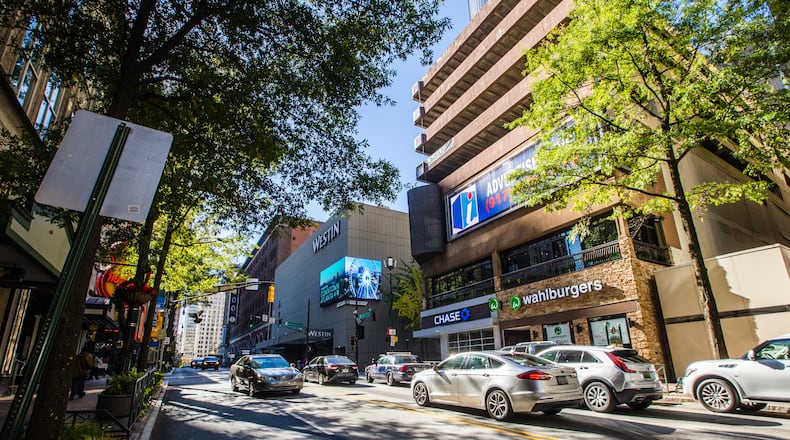You may be familiar with Atlanta Streets Alive, the initiative that occasionally blocks off some of the city’s notoriously car-friendly streets to allow only bicyclists and walkers.
Now, a proposal has surfaced to apply that concept to Atlanta’s most iconic street on a regular basis.
Councilman Amir Farokhi, who represents much of Midtown and downtown, introduced legislation Monday that would temporarily close Peachtree Street to car traffic between Mitchell and 14th streets — over 2.5 miles — one Sunday per month for a year.
The proposal as written would keep the street closed for four hours, from 2 to 6 p.m., which is shorter than past Streets Alive events have been. And it wouldn’t begin until next January.
A Streets Alive event was held on Peachtree in 2019. The Atlanta Bicycle Coalition, which organizes the program, has been pushing for it to be a monthly installment.
The idea has support from transportation advocates, but could face opposition from the small but vocal group of residents and business owners that also pushed back on the “Shared Peachtree” pilot project, which blocked off two lanes of Peachtree downtown for just bicyclists and walkers.
We’ll keep you posted as the plan is discussed at City Hall, starting with a transportation committee meeting Wednesday.
---
Mayor Andre Dickens was given an 88-page report from his transition team last week with dozens of recommendations on how to make the city work better. We have a full overview of the report, which focused on four general areas: public safety, ethics, neighborhoods and the city’s youth.
A few things that caught our eye:
- Members of the Atlanta business community and policy advocates expressed “concerns that donations to political campaigns are perceived to be a prerequisite to future success in city procurement or airport contracting processes.” The transition team recommended restricting campaign contributions from city contractors.
- The report recommended creating an “Office of Neighborhoods” to make folks in the city’s residential areas feel more connected to City Hall.
- It said the city should consider making changes to its Neighborhood Planning Unit system, which was established in 1974 to give neighborhoods more of a role in city decision-making. But the transition report said “the power of the NPU has diminished, with NPUs serving primarily as an administrative body in 2022. There is a need to revisit the current charge given to NPUs and determine if this is sufficient to elevate resident voices.”
---
The city’s “Midnight Basketball” program is now a weekly event. The season will run until June 8 at the C.T. Martin rec center on M.L.K. Drive in southwest Atlanta, starting (ironically) at 7 p.m. every Wednesday. Dickens restarted the program this year as part of his efforts to increase community policing and engagement and tackle root causes of crime in Atlanta.
---
Quote of the week:
“It's such a Kafkaesque, dystopian situation."
The issue of city-ordered demolitions took center stage at City Hall this week with a work session focusing on how the process can be improved. We have in-depth coverage of the issue, including a look at what parts of the city see the most demolitions.
---
Council corner: The City Council returned from recess with lots of new ordinances to introduce. They’ll be discussed during committee meetings this week. A couple we have our eye on:
- A proposal to establish a commission focused on the topic of short-term rentals, AKA vacation rentals that Atlanta residents can list on sites like Airbnb and VRBO. The AJC has coverage of the latest developments on that issue.
- An ordinance asking the city finance department and MARTA to study whether it would be feasible for MARTA to be free for Atlanta residents. Making MARA fare-free is one of the mayor’s long-term goals.
Keep Reading
The Latest
Featured



